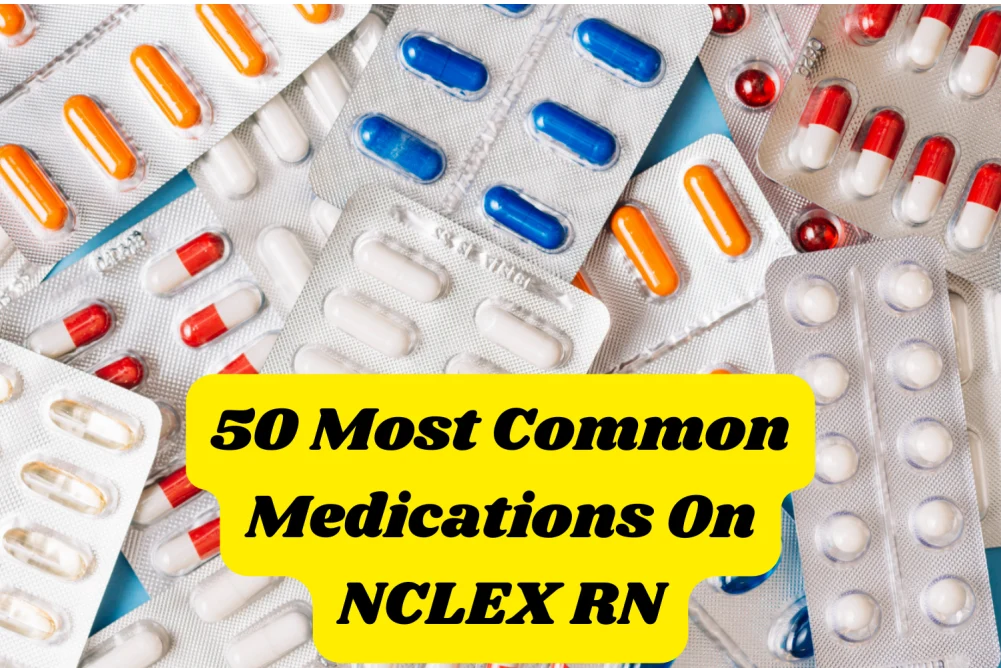How To Study Pharmacology for NCLEX RN: Your Ultimate Study Guide

Conquering the NCLEX RN is a significant milestone for aspiring nurses, and let’s face it, pharmacology often seems like the most daunting hurdle. But fear not, future Nightingale! With the right study approach and a clear understanding of what the exam throws your way, you can master this crucial subject and confidently answer those pharmacology questions. So, grab your pens, open your textbooks, and dive into this comprehensive guide to How to study pharmacology for NCLEX RN
How to Study Pharmacology For NCLEX RN?: Best Way By Experts
When it comes to studying pharmacology, adopting effective strategies is key, not worrying for someone to take my online nursing class. Here are some tried-and-true methods to enhance your understanding:
1. Engage in Active Learning
Rather than passively reading through drug lists, actively engage with the material. Create flashcards, draw concept maps, or teach the information to a study partner. Active learning reinforces your understanding and promotes long-term retention.
2. Utilize Online Resources
Take advantage of online platforms offering pharmacology courses, which can provide interactive lessons, quizzes, and video explanations. These resources often cater specifically to nursing students, making the content more relevant to your studies.
3. Incorporate Mnemonics and Memory Aids
Pharmacology involves memorizing numerous drug names and classifications. Mnemonics and memory aids can be invaluable for recalling this information during exams. Create your own mnemonic devices or leverage those available online to make memorization more manageable.
4. Understand Drug Classes and Mechanisms of Action
Instead of rote memorization, focus on understanding drug classes and their mechanisms of action. This approach allows you to apply your knowledge to different scenarios, a skill that is crucial for answering NCLEX style questions.
5. Use Drug Guides and Review Books
Invest in reputable drug guides and review books specifically designed for nursing students. These resources often provide concise yet comprehensive information on medications, making a Take My Exam valuable tools for exam preparation.
150+ ![]()
Qualified Tutors
Pharmacology Study Tips
Mastering pharmacology requires a combination of effective study techniques. Consider the following tips to enhance your pharmacology study sessions:
1. Create a Study Schedule
Devote specific time slots in your study schedule to pharmacology. Consistency is key, and breaking down the material into manageable chunks can prevent overwhelm.
2. Focus on High-Yield Topics
Conquering the NCLEX-RN exam requires strategic studying, and prioritizing high-yield topics is crucial for maximizing your chances of success. These frequently tested areas often appear as both standalone questions and woven into case studies, demanding a solid understanding from aspiring nurses. Here’s a breakdown of key high-yield topics to focus your study efforts on:
1. Cardiovascular System:
Coronary artery disease (CAD):
Angina pectoris, myocardial infarction (MI), heart failure, interventions (stents, CABG).
Arrhythmias:
Atrial fibrillation, ventricular fibrillation, bradycardia, tachycardia, ECG interpretation.
Hypertension: Medications, complications, patient education.
Congestive heart failure (CHF):
Signs and symptoms, stages, medications, patient education.
2. Gastrointestinal System:
Peptic ulcer disease (PUD):
Gastric and duodenal ulcers, medications, lifestyle modifications.
Gastroesophageal reflux disease (GERD): Symptoms, complications, medications, lifestyle modifications.
Inflammatory Bowel Disease (IBD):
Crohn’s disease and ulcerative colitis, symptoms, medications, nursing interventions.
Hepatitis: Types, transmission, symptoms, complications, vaccinations.
3. Medication Administration:
The 7 Rights of Medication Administration:
Right patient, right drug, right dose, right route, right time, right documentation, right reason.
High-alert medications: Narcotics, anticoagulants, insulin, knowledge of their specific actions and side effects.
Calculating medication dosages:
Accurately converting between different units of measurement.
Safe medication administration practices: Recognizing and preventing medication errors.
4. Pain Management:
Types of pain:
Acute vs. chronic, nociceptive vs. neuropathic pain.
Pain assessment tools:
VAS, McGill Pain Index, behavioral cues.
Pharmacological pain management:
Opioids, non-opioids, and adjuvants, understanding their mechanisms of action and side effects.
Non-pharmacological pain management:
Relaxation techniques, positioning, heat/cold therapy, distraction.
5. Basic Nursing Skills:
Vital signs assessment:
Accurate measurement and interpretation of temperature, pulse, respiration, blood pressure.
Aseptic technique: Maintaining sterile technique during procedures to prevent infection.
Documentation:
Charting accurately, concisely, and timely on patient’s condition and interventions.
Patient education:
Teaching patients about their condition, medications, and self-care strategies.
3. Practice NCLEX-Style Questions Regularly
To familiarize yourself with the exam format, integrate NCLEX-style questions into your study routine. This not only reinforces your pharmacology knowledge but also hones your test-taking skills.
4. Join Study Groups
Collaborate with fellow nursing students to form study groups. Explaining concepts to others and discussing challenging topics can deepen your understanding and provide different perspectives.
5. Seek Clarification When Needed
If certain concepts or medications are unclear, don’t hesitate to seek clarification from professors, mentors, or online forums. Understanding the fundamentals is crucial for building a strong foundation in pharmacology.
NCLEX RN Style Questions:
Understanding the question format and emphasis is crucial for success:
NCLEX RN pharmacology questions are typically application-based, requiring you to analyze a patient’s situation and choose the most appropriate medication or nursing intervention.
Priority setting and delegation are often tested, so focus on understanding which actions require your immediate attention and which can be delegated to other healthcare professionals.
Beware of answer choices with similar-sounding names or overlapping indications. Read each option carefully and eliminate those that don’t perfectly match the scenario.
150+ ![]()
Qualified Tutors
Is There A Lot Of Pharmacology On The NCLEX RN?
While the exact percentage varies from exam to exam, pharmacology consistently makes up a significant portion of the NCLEX RN. Dedicating sufficient time and effort to this subject is crucial for overall success.
Can You Pass The NCLEX RN Without Knowing Pharmacology?
Technically, it’s possible, but highly unlikely. Pharmacology is a core nursing competency, and the NCLEX RN heavily tests your understanding of medications and their implications for patient care. Neglecting this subject puts you at a significant disadvantage.
How Do Nurses Memorize Pharmacology Drugs?
Memorization is certainly part of the equation, but effective learning goes beyond rote memorization. Here are some techniques:
Active recall:
Regularly test yourself on drug names, classifications, indications, side effects, and dosages using flashcards or practice questions.
Spaced repetition:
Review previously learned material at increasing intervals to reinforce your memory.
Visualization:
Create mental images of drug structures, mechanisms of action, or potential side effects to aid recall.
Teaching others:
Explaining concepts to someone else can solidify your own understanding.
50 Most Common Medications On NCLEX RN:

Here are 50 of the most common medications on the NCLEX RN
- Acetaminophen
- Albuterol
- Amlodipine
- Amoxicillin
- Aspirin
- Atorvastatin
- Benzonatate
- Ceftriaxone
- Clopidogrel
- Dexamethasone
- Digoxin
- Diphenhydramine
- Docusate
- Donepezil
- Enalapril
- Enoxaparin
- Epinephrine
- Epoetin alfa
- Fentanyl
- Furosemide
- Gabapentin
- Heparin
- Hydrochlorothiazide
- Ibuprofen
- Insulin (various types)
- Ipratropium-Albuterol
- Ketorolac
- Labetalol
- Levothyroxine
- Lisinopril
- Lorazepam
- Losartan
- Metformin
- Methotrexate
- Metoprolol
- Morphine
- Naloxone
- Omeprazole
- Ondansetron
- Pantoprazole
- Prednisone
- Propofol
- Ranitidine
- Rivaroxaban
- Rosuvastatin
- Sertraline
- Simvastatin
- Warfarin
- Zolpidem
FAQs:
1. How long should I study pharmacology for the NCLEX RN?
There’s no magic number, but aim for consistent, dedicated study sessions throughout your nursing program. Start early, integrate pharmacology into your overall curriculum, and gradually increase study time as exam day approaches.
2. What are some good NCLEX pharmacology resources?
Numerous resources are available, including NCLEX review books, online question banks, educational videos, and mobile apps. Choose resources that align with your learning style and preferences.
3. How can I manage test anxiety during the NCLEX RN?
Relaxation techniques like deep breathing and meditation can help calm your nerves. Familiarize yourself with the testing environment beforehand, get a good night’s sleep before the exam, and arrive early to avoid last-minute stress.
4. What if I make a mistake on a pharmacology question?
Don’t dwell on it! Analyze your error afterward to understand what went wrong and learn from it. Move on to the next question and stay focused on completing the exam to the best of your ability.
5. What happens if I don’t pass the NCLEX RN the first time?
Don’t be discouraged! Many nurses don’t pass on their first attempt. Utilize feedback from your exam results, re-evaluate your study approach, and seek support from instructors or tutors. You can succeed on the next attempt with renewed effort and dedication.
Conclusion:
Conquering pharmacology for NCLEX RN may seem daunting, but with a strategic study plan, active engagement with the material, and effective memorization techniques, you can master this crucial subject and confidently answer those exam questions. Remember, consistent effort, focus on understanding, and utilizing diverse resources are key to success. So, take a deep breath, embrace the challenge, and approach pharmacology with a positive attitude. You’ve got this, future nurse!
I am a Natural sciences enthusiast with a profound passion for Biology, Chemistry, Statistics, and Physics. Completed more than 1055+ online classes and exams for the students. So they score high and stress less!
Discount
On Your First Order




